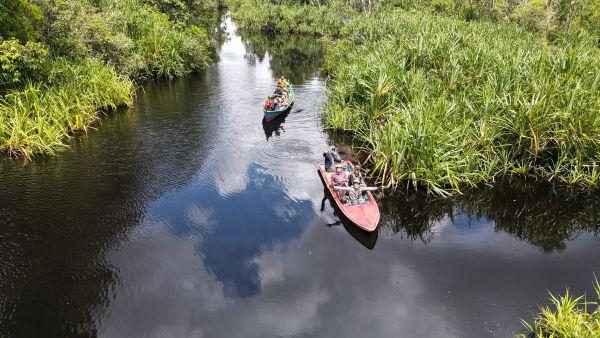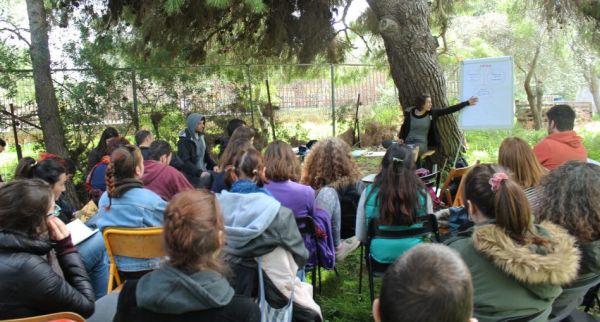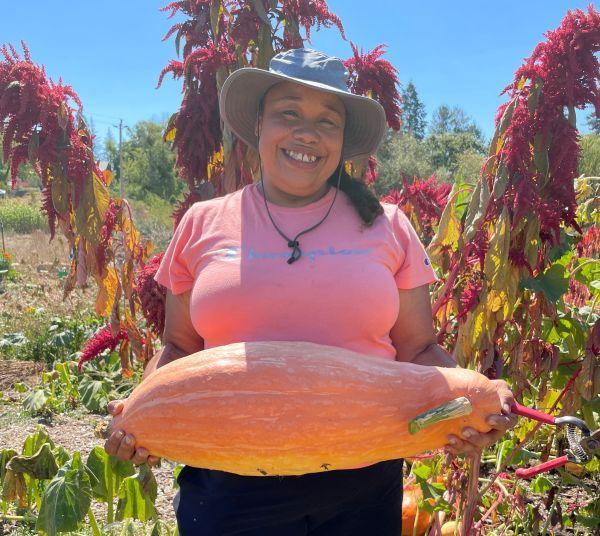Established Award
Dieser Preis geht an etablierte Gesellschaftsgruppen, Organisationen, Netzwerke und Unternehmen, die seit mehr als 5 Jahren erfolgreiche und inspirierende Projektarbeit leisten.
Wir wollen, dass das Preisgeld hilft, ihre Arbeit bekannt zu machen und mehr Menschen zu inspirieren, sich an der Regenerationsbewegung zu beteiligen.
In dieser Kategorie gibt es mindestens zwei Preise, die jeweils mit bis zu 25.000 Pfund dotiert sind. Wir beabsichtigen, einen Preis für ein kleines Projekt in dieser Kategorie zu vergeben.
Die Preisträger*innen des Jahres 2023
Preisträger
Himalayan Permaculture Centre (HPC)
HPC ist eine von der Basis ausgehende, der Permakultur verschriebene NGO im Westen Nepals. Es ist in abgelegenen, armen Bauerngemeinden tätig, deren Ressourcen ausgebeutet wurden. Das Zentrum wird von Farmer*innen aus den Bezirken Surkhet und Humla betrieben.
Gemeinsam mit lokalen Gemeinschaften in 31 Dörfern leitet das HPC regenerative Projekte nach einem einzigartigen sektorübergreifenden Ansatz, der Ernährungssicherheit und Ernährungssouveränität, Gesundheit, Bildung, Existenzsicherung und Kapazitätsaufbau verbindet. Das Ergebnis sind wohlhabende Dörfer mit einer Vielfalt an Lebensgrundlagen, Kultur und biologischer Vielfalt, deren Einwohner*innen nicht gezwungen sind, sie aufgrund von Armut zu verlassen.
Die Strategie des HPC ruht auf vier Säulen.
Demonstration:
- Es demonstriert agrarökologische Methoden und Technologien für eine resiliente einheimische Nahrungsmittel- und Energiesicherheit.
- Die Demonstrationen erfolgen in seinen Resource Centers sowie durch Farmer*innen auf deren eigenen Feldern.
- 178 Farmer*innen sind jetzt „Demonstrationshaushalte“, die Verbesserungen im Hinblick auf die Vielfalt der landwirtschaftlichen Tätigkeiten und eine Einkommenssteigerung aufweisen.
Schulung und Ausbildung:
- Das Zentrum bietet Schulungen für agroökologische Methoden, Gesundheitsvorsorge und Alphabetisierung.
- 7.872 Farmerinnen und 8.253 Farmer wurden geschult.
- 41 befragte Demonstrationsfarmer*innen erzielten im vergangenen Jahr einen Einkommenszuwachs von insgesamt 50.000 Pfund, der direkt auf die Schulungsmaßnahmen zurückzuführen ist.
Ressourcen:
- Bereitstellung von Saatgut, Setzlingen, Informationen, Infrastruktur und Netzwerken für Farmer*innen
- Farmer*innen haben 82.000 Obstbäume und 117.000 Mischbäume und -sträucher in 31 Dörfern angepflanzt
- Es wurden 17 Schulungsvideos aufgezeichnet und 12.000 Exemplare des „Handbuchs für Farmer*innen“ verteilt..
Forschung:
- Identifizierung innovativer Verfahren und Ressourcen, die von den Farmer*innen genutzt werden können
- Es wurden 800 rauchfreie Öfen zum Nulltarif aus 100 % einheimischen Rohstoffen hergestellt, wodurch der Brennholzverbrauch um 35 % und Lungen-, Augen- und HNO-Probleme um 60 % zurückgingen.
- 2023
- Established Projects
Projektinformationen
- English
- https://www.himalayanpermaculture.com/
- https://www.facebook.com/HPC.Nepal/
- cevans@gn.apc.org
- Himalayan Permaculture Centre, Chingard-1, Surkhet, Nepal
Preisträger
Jupago Kreká Collective
Das Jupago Kreká Collective wurde 2005 gegründet, nachdem das indigene Volk der Xukuru sein traditionelles Gebiet zurückerobert hatte.
Der Kolonisierungsprozess hatte die Lebensweise der Xukuru aus dem Gleichgewicht gebracht und die Überlebensfähigkeit ihrer landwirtschaftlichen Systeme, Verfahren und Kenntnisse gefährdet. Das Kollektiv stellte sich der Herausforderung, Umwelt und eine gesunden Geisteshaltung wiederherzustellen.
Seine Arbeit basierte auf den Prinzipien von „Lymolaygo Toype“ (Quell des Lebens), mit dem Ziel, das System der Flächenverwertung abzuschaffen, eine Nachwirkung des Kolonialisierungsprozesses.
Jupago Kreká will Prozesse koordinieren, die es ermöglichen, nachhaltige Erfahrungen in indigenen Familien zu identifizieren, diese Praktiken zu systematisieren und die Ergebnisse zu sozialisieren.
Die wichtigsten Errungenschaften von Jupago sind bisher:
- Ein Gemeinschaftsabkommen zum Schutz und zur Regeneration von 360 Hektar des Boa Vista Sacred Complexes.
- Jährlich werden über 5.000 Bäume gepflanzt. Gleichzeitig werden Maßnahmen zur Regeneration der Umwelt ergriffen, nach dem Prinzip von Kosmo-Kernen, das auf der Harmonie zwischen allen sichtbaren und unsichtbaren Wesen beruht. Auf diese Weise wurden mehrere Quellen wieder zum Leben erweckt, die neue Bäche und sogar Wasserfälle hervorbrachten, die die heutige Generation in diesem Gebiet noch nie zuvor gesehen hatte.
- MEinrichtung des Jeti-Radyah-Labors zur Herstellung traditioneller Arzneimittel aus einheimischen Arten, die kostenlos an die Bevölkerung verteilt werden. Darüber hinaus wurde ein lokaler Solidaritätsladen eröffnet, in dem die Gemeinschaft den Besuchern die wunderbare Wirkung von Medikamenten vermitteln und lokales Kunsthandwerk zeigen kann.
Die Xukuru glauben, dass der Mensch Teil der Natur ist und daher die Heilung der Natur für die Heilung des Menschen notwendig ist. Jupago will für die wunderbare Verbesserung des Lebens sorgen, durch Handlungen, die sich um alles Leben in seiner Umgebung kümmern, indem sie sich um die Natur kümmern, die Heilige Natur.
- 2023
- Established Projects
Projektinformationen
- Portuguese
- https://www.instagram.com/caxoxukuru/
- +5583987660260
- Aldeia da Boa Vista, Território Indígena Xukuru do Ororubá Pesqueira PE 55200-000 Brazil
Auf der Shortlist
Alam Sehat Lestari (ASRI)
ASRI is an NGO that began in 2007 in western Borneo in Indonesia, which co-designs solutions to key issues facing local communities and tropical rainforests.
ASRI asked community members surrounding Gunung Palung National Park what they would need in order to protect the climate-critical rainforest. The communities described key needs as healthcare, regenerative livelihood training, and conservation education.
The NGO works to conserve the biodiversity of tropical rainforests by meeting the health and economic needs of surrounding communities, in several ways.
- Medical centre: Costs are tiered according to each village’s progress toward reducing logging. Patients can pay for healthcare using tree seedlings for reforestation. Mobile clinics provide healthcare to remote communities.
Community education is provided in the clinic waiting rooms, mobile clinic waiting rooms, and in the villages. - Chainsaw Buyback Programme: Support loggers to transition to more sustainable livelihood. Chainsaws are taken and in return, provide support for the new livelihood.
- Regenerative organic farming training: This helps to end slash-and-burn agriculture and increases yields.
- Rainforest restoration: It creates wildlife corridors and buffer zones in collaboration with National Park officials and community members. Together with the Garden to Forest programme, over 277 hectares have been reforested.
- Garden to Forest programme: This supports farmers in reforesting illegal gardens. Farmers are trained in human-orangutan conflict and commit to not clearing land. In exchange, park officials legally recognise farmers’ rights to harvest fruit and non-timber forest products.
- Goats for Widows programme: It supports widows with the skills to raise goats for their long term income.
- Kids and Teens programmes: These provide after-school programs and camps about health and conservation.
In 2018 ASRI expanded to villages near Bukit Baka Bukit Raya National Park (BBBR), a 230,000 hectare rainforest in central Borneo. Its planetary health model is also being replicated by Health In Harmony, in Madagascar and Brazil.
- 2023
- Established Projects

Projektinformationen
- Indonesian, English
- https://www.alamsehatlestari.org/
- https://www.facebook.com/AlamSehatLestari/
- https://twitter.com/yayasanasri
- febri@alamsehatlestari.org
- Jalan Sungai Mengkuang Sukadana Kayong Utara, West Kalimantan 78852 Indonesia
Deccan Development Society
Deccan Development Society (DDS) is a 39-year-old grassroots organisation in Telangana, India. It works with nearly 50 village-level voluntary associations (sanghams), led by 5000 dalit and indigenous female small-holding farmers.
At a time when development for dryland farmers only meant groundwater extraction and shifting to mono-cropping of commercial crops, DDS recognised the effects these shifts had on ecology and gender relations. It understood that traditional farming practices were valued by poorer women with degraded soils due to the holistic benefits they offer in human, livestock and soil health, whereas men narrowly focused on yield and the monetary benefits it offers. This inspired
DSS to pursue participatory and sustainable development methods that could assert the sanghams’ autonomy in multiple spheres like food, nutrition, seeds, market, media and so on.
By valuing the indigenous knowledge of these women on food and farming, and by using bottom-up participatory decision-making, the society has implemented successful initiatives that integrate:
- Ecological conservation
- Livelihood development
- Gender and social justice
- Food security
- Health and nutrition enhancement
- Agro-biodiversity
The Society is now active in 30 village sanghams, supporting rainfed biodiverse farming, grassroots health and legal workers, community led market for millet produce and also engaging in awareness events, information publications and advocacy campaigns. These activities ensure earth-care and human care and raise the profile of women as leaders in their villages.
Over the decades, DDS has designed integrative programmes such as eco-employment days, Community Gene Bank, Medicinal Plant Commons, Community Grain Fund, Balwadies and more which have been replicated and scaled up by other CSOs and also the government.
- 2023
- Established Projects

Projektinformationen
- English
- http://www.ddsindia.com/
- https://www.facebook.com/Deccan-Development-Society-785099524902651
- https://twitter.com/DDS_SANGHAMS
- +91-40-27764577 / 27764744
- ddshyderabad@gmail.com
- 101 Kishan Residency, Street No 5, Begumpet, Hyderabad - 500016 Telangana, India
Drylands Natural Resources Centre (DNRC)
Drylands Natural Resources Centre (DNRC) is a Kenyan registered NGO, operating in Makueni County, Kenya.
Its vision is of sustainable and resilient communities in the drylands of Kenya. It seeks to bring about improved livelihoods of the marginalised communities and people living there.
The organisation equips subsistence farmers in drylands with the tools to restore degraded lands and address the challenges of deforestation, falling agricultural yields, failing livelihood, water scarcity, loss of traditional knowledge and climate change through permaculture and agro ecological best practices.
DNRC is currently working with 800 smallholder households (about 4,200 people) and 12 schools (about 3,000 pupils). Achievements so far include:
- It has grown organically. From planting 5000 different tree saplings per year, in 2021 it planted 70,000 tree seedlings and over 35 different tree species. All these trees have been planted on the most degraded areas of land of smallholder farms and schools
- Over 250 farmers and officers from other regions have visited and learnt from its work
- It has trained over 50 students who are pursuing either diploma or degrees from different universities and colleges
- It has hosted and trained both local and international students in permaculture, dryland tree nursery establishment and management and Agroecology
- 2023
- Established Projects

Projektinformationen
- English
- https://dnrckenya.co.ke/wp/
- https://www.facebook.com/DNRCKenya/
- ngali1973@gmail.com
- P. O Box 2385, Code 90100, Kenya
Fundación Lurgaia Fundazioa
LURGAIA was born in 2002 in Vizcaya, Basque Country, with the aim of WORKING for the environment.
In Vizcaya, native forests have almost disappeared, replaced by industrial forestry crops.
These monocultures, although necessary, have a negative impact and lack the biodiversity of a natural forest. Every so often, they are cut down to make short-term products, such as paper, immediately releasing the sequestered CO2. Intensive exploitation forces the use of fertilisers and phytosanitary products, impoverishing, polluting and eroding the soil. All the vegetation is eliminated and the cycle must start from scratch, making it impossible to reach the degree of maturity necessary for the health of the forest and, as we already know, for our health.
In a privileged economic context like this, most plantations are in private hands and do not represent a way of life but an extraordinary contribution. More and more owners decide to take a step in favour of the planet and convert their land into forests without exploitation.
The LURGAIA Foundation works to recover a part of this lost heritage so that there is a better balance between economy and conservation. And it does so by involving society.
So far it has:
- Grown its ‘U’ndabaso project’ from four hectares in 2008 to 170 hectares now.
- Regenerated more than 600 hectares
- Forged strong alliances with a range of stakeholders in the area
- Developed a powerful volunteer network of more than 2,300 people
- Involved small and medium-sized companies
- 2023
- Established Projects

Projektinformationen
- Basque, Spanish
- https://lurgaia.org/
- https://www.facebook.com/lurgaia
- +34 946 576 110
- info@lurgaia.org
- Luzarra 16, 3º, Departamento 2 Bilbao Bizkaia 48014 Spain
Permaculture in Ukraine (PIU)
Permaculture in Ukraine (PIU) was established in 2012 after the first Permaculture Design Course (PDC) in Ukraine. It is an NGO. Since then it has been organising PDCs every year and is currently the only organisation promoting sustainable agriculture in Ukraine.
Over the years PIU has:
- Run courses to share knowledge and skills
- Held conferences and permaculture gatherings to exchange experiences, motivate members and accumulate scientific data
- Translated and published books to share world best knowledge
In 2017 it established a network of permaculture centres that now comprises of 16 demonstration sites across Ukraine. Each centre practises permaculture, organises courses and other events and hosts volunteers.
When the war in Ukraine began, Permaculture in Ukraine partnered with the ecovillage community GEN Ukraine to start a new initiative: Green Road of Ecovillages.
The initiative mobilised the existing network of ecovillages and permaculture centres to host internally displaced people. More than 3000 people passed through around 60 locations. 450 internally displaced peoples will stay here during the winter of 2022-23. As part of this project, PIU is seeking to support food security through a range of approaches, from providing small scale agriculture equipment to education.
- 2023
- Established Projects

Projektinformationen
- Ukranian, English, Czech, Hungarian, Polish, Slovak
- https://permaculture.in.ua/
- https://www.facebook.com/PermacultureUkraine
- +380679678793
- perma.ukraine@gmail.com
- Holosiivsky av. 84 ap. 71 Kyiv Kyiv 03040 Ukraine
School of the Earth (SoE)
School of the Earth (SoE) was founded in 2009 in Greece with the aim to inform, educate, inspire and support people to redefine their needs and redesign their lives, for the transition to a regenerative future.
The SoE develops activities along the following streams:
- Permaculture design and regenerative agriculture
- Renewable energy and off grid systems
- Climate crisis and nature based responses
- Homesteading skills
- Community building and cultural regeneration
- Refugee support, vocational training and integration
Until 2013 SoE was an urban community centre, facilitating the transformation of physical and social spaces in Athens. It then moved to a small suburban farm and created a permaculture community centre and test site for researching and adapting different techniques to the Mediterranean climate. This was the first permaculture educational centre in Greece and serves as a focus point for the local network.
Over the years, SoE has:
- Designed and established regenerative land-based projects and off grid renewable energy systems for farms, businesses, refugee settlements and remote communities – across Greece and abroad.
- Organised 150 seminars and 80 long-term educational programs, with more than 7000 participants and supported students’ projects
- Produced educational material and manuals
- Worked with local grassroots initiatives around food sovereignty, energy and climate justice and organised related events, gatherings and festivals with more than 10,000 attendees
- Introduced permaculture design and homesteading skills’ sharing into Greek refugee camps and promoted them as a tools for facilitating integration and developing entrepreneurial initiatives.
- 2023
- Established Projects

Projektinformationen
- Greek
- https://neaguinea.org/
- https://www.facebook.com/profile.php?id=100063485025676
- neaguinea@riseup.net
- Alkionis 5 & Marathonodromon Nea Makri Attica 19005 Greece
The Cultural Conservancy (TCC)
The Cultural Conservancy (TCC) is a Native-led non-profit organisation based in San Francisco, CA founded in 1985. It is deeply rooted in Turtle Island (North America) with strong connections to Hawai’i, and has expanded across the American continent and Moana (greater Pacific).
TCC works with Native/Indigenous peoples locally and globally on community-based projects that are shaped by community requests and guided by the Native Advisory Council of Traditional Knowledge Holders, land-care practitioners, and community leaders. TCC commits to Indigenous youth and elders and promotes intergenerational knowledge exchange.
Its mission is to protect and revitalise Indigenous cultures through the direct application of traditional knowledge and practices on ancestral lands. It facilitates community-led transformation for those struggling with food access, land displacement, and physical, spiritual, and cultural health.
From language revitalization and traditional carving projects to Indigenous agricultural sciences and traditional land tending, critical to TCC’s work is the acknowledgement of the sacred relationship Native peoples have to lands and waters and the importance of this relationship to physical, mental, and community health.
TCC focuses on:
- Eco-cultural revitalization
- Biocultural diversity
- Renewing and restoring the health of traditional knowledge
- Foodways
- Landscapes
- Practices of Indigenous cultures that were substantially damaged by colonialism
Its flagship Native Foodways Program and new land project Heron Shadow work to provide safe, culturally-rooted spaces, access to traditional knowledge systems, Indigenous agricultural sciences, and resources for growing healthy culturally appropriate foods including planting, harvesting, processing, distributing, cooking and seed keeping.
- 2023
- Established Projects

Projektinformationen
- English
- https://www.nativeland.org/
- https://www.facebook.com/TheCulturalConservancy/
- https://twitter.com/TCCNativeland
- +1 (415) 561-6594
- tcc@nativeland.org
- Sara Moncada, CEO, The Cultural Conservancy, P.O. Box 29044, Presidio of San Francisco, CA 94129-0044, USA
Viracocha Foundation for Alternative Development
The Viracocha Foundation, established in 2000, is based in San Agustín- Huila, Colombia.
San Agustín is an area recognized as a UNESCO Constellation Belt Andean Biosphere Reserve, and is home to the UNESCO 1995 Historical and Cultural Heritage Archaeological Park and Magdalena River, the main water source of Colombia.
Viracocha was established in response to a degenerative culture that had degraded natural resources, causing problems such as poverty, malnutrition, unemployment, uprooting, expansion of the agricultural frontier, impacting the strategic ecosystems of the territory.
Its work supports the transition towards resilient communities and ecosystems. This integrates the basic needs of the human being (food, home, occupation, learning, environment, communication, freedom and spirituality) from a regenerative perspective.
It seeks to:
- Make a bridge between farmers and permaculture
- Strengthen agri-food systems by recovering traditional knowledge and local biodiversity related to agriculture, gastronomy, use of medicinal plants, beekeeping and bird life
- Strengthen food security and sovereignty by recovering native seeds and implementing the KIWICHA Seed House, the first in the region.
- Train leaders and multipliers of the rural community, associative groups and students
- Promote healthy eating through a community dining room
- Teach bio construction techniques to improve living conditions
In 2002, Viracocha created the Food & Education Program (PAE), benefiting 400 children from families living in conditions of poverty and malnutrition.
In 2006, the Agroecological Permacultural Education Center (CEPA) was created, a nine-hectare farm that acts as a living model of Permaculture and regenerative systems.
- 2023
- Established Projects

Projektinformationen
- Spanish, English, German
- https://www.fundacionviracocha.org/%20also%20https://www.viracocha-ev.de/
- https://www.facebook.com/viracochasanagustin/
- fundacionviracocha@yahoo.es
- Finca VIRACOCHA - Vereda la Antigua San Agustín Huila 418060 Colombia